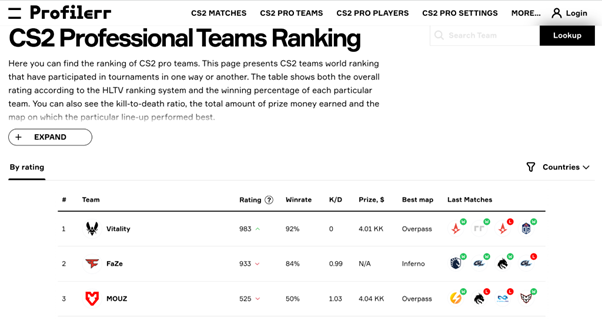Insightful Updates
Stay informed with the latest news and trends.
CS2 Pro Team Rankings That Will Make You Rethink Your Favorite Squad
Discover the surprising CS2 pro team rankings that will challenge your loyalties and redefine your favorite squads!
Top 10 CS2 Pro Teams: Who's Dominating the Scene Right Now?
As the competitive landscape of Counter-Strike 2 (CS2) evolves, the spotlight shines on the top-tier teams that are dominating the scene. The following list highlights the Top 10 CS2 Pro Teams that have consistently showcased exceptional skill, teamwork, and strategy, making them formidable contenders in various tournaments:
- Team A
- Team B
- Team C
- Team D
- Team E
- Team F
- Team G
- Team H
- Team I
- Team J
Each of these teams brings a unique playstyle to the table, and their performances in recent competitions reflect their dedication to the game. As we examine the strengths and strategies of these elite teams, it becomes clear that they are not just participating in the CS2 ecosystem; they are actively shaping its future.

Counter-Strike is a highly popular first-person shooter game that pits teams against each other in various objective-based gameplay modes. Players can enhance their experience through various platforms; for example, cs.money case opening provides options to explore different weapon skins and cases. The game is known for its competitive scene and strategic depth, attracting millions of players worldwide.
The Rise and Fall of CS2 Squads: What Does It Mean for Rankings?
The rise and fall of CS2 squads have become a significant topic in the gaming community, especially for enthusiasts analyzing their rankings. As teams encounter fluctuations in performance due to roster changes or varying skill levels, understanding these dynamics is crucial for fans and players alike. For instance, a squad that burst onto the competitive scene may see a dramatic increase in their rankings after a series of key victories. However, this can be quickly followed by a downturn if a core player leaves or if they fail to adapt to the evolving meta.
Moreover, the implications of these shifts extend beyond mere numbers; they influence team sponsorships, fan engagement, and future opportunities. A sudden fall in rankings can result in decreased visibility at major tournaments and less support from sponsors. Teams must maintain consistent performance to keep their place in the ever-evolving ecosystem of CS2. Hence, the rise and fall of squads is not just a matter of performance but a reflection of the broader competitive landscape in the world of esports.
Are Your Favorite Teams Overrated? A Deep Dive into CS2 Pro Rankings
As the competitive landscape of CS2 continues to evolve, the question arises: are our favorite teams truly living up to the hype, or are they merely riding a wave of overrated expectations? A deep dive into the CS2 pro rankings reveals a complex picture where skill, strategy, and sometimes sheer luck play pivotal roles in determining a team's standing. For fans, it can be challenging to separate genuine talent from teams that simply dominate the social media narrative. Analyzing recent match statistics and player performances provides a clearer lens through which to view these teams.
One key factor contributing to the perception of a team being overrated is their ranking inconsistencies. For example, consider the following aspects in the CS2 pro rankings:
- Match Outcomes: Regularly losing to lower-ranked teams can taint a reputation.
- Player Dynamics: Roster changes and player performance fluctuations can impact team synergy.
- Fan Expectations: The hype created by passionate fanbases can sometimes skew realistic evaluations.